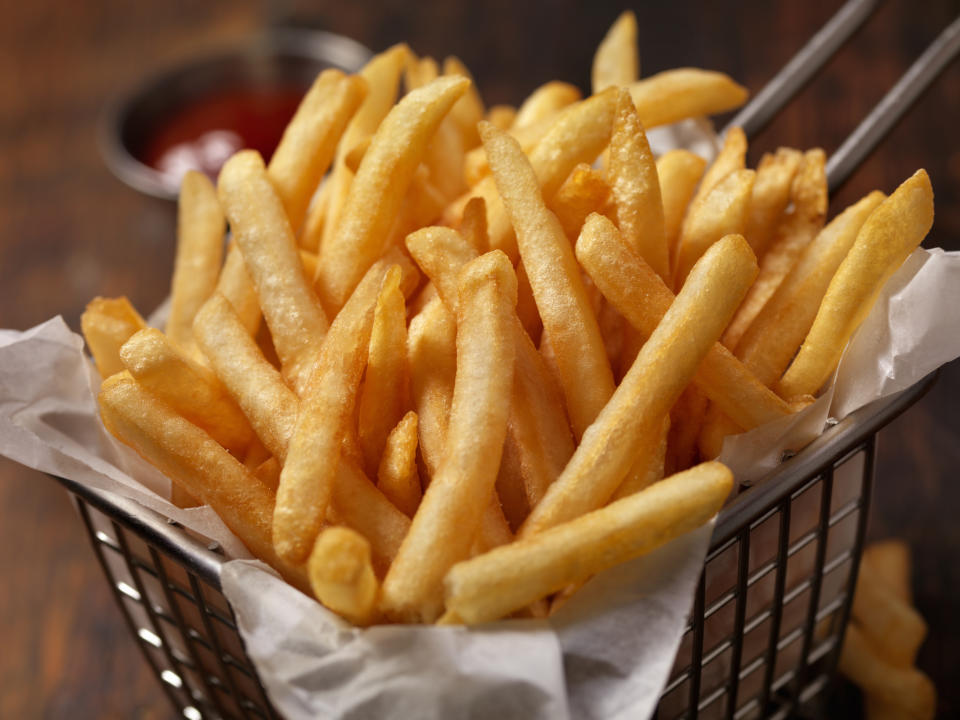What The Health?!: Can eating junk food really make you go blind?
Can leftover spaghetti really kill you? Can you actually cough up a blood clot in the shape of your lung? In Yahoo Lifestyle Canada‘s newest series, What The Health?!, we ask doctors to weigh in on odd health news stories and set the record straight. Be sure to check back every Friday for the latest.

Here’s a way to get your teenager to stop subsisting on junk food: a poor diet can make you go blind.
A 17-year-old boy lost his sight after years of eating mainly french fries, Pringles, and white bread, according to a case study published in the journal Annals of Internal Medicine.
ALSO SEE: What The Health?! Spanish health authorities issue alert after children develop 'werewolf syndrome'
Scientists from Bristol Medical School and the Bristol Eye Hospital in the UK examined the case of a teenage patient considered a “fussy” eater who first went to his doctor at age 14 complaining of fatigue. The boy had a normal body mass index (BMI), no apparent signs of malnutrition and wasn’t taking any medications. Tests revealed anemia (a lack of red blood cells to carry oxygen throughout the body, commonly caused by iron or vitamin deficiency) and low levels of vitamin B12. He was given vitamin B12 injections and dietary advice.

A year later, the boy went back to his doctor and complained of experiencing hearing loss and vision problems. However no cause was determined and the link between his nutritional status and vision wasn’t picked up.
By the time he was 17-years-old his vision loss had become permanent. The boy was found to have vitamin B12 deficiency, low copper and selenium levels, a high zinc level and severely reduced vitamin D level and bone mineral density.
According to the case study, the teen had consumed a limited diet of fries, potato chips, white bread and some processed pork from the time he began secondary school around age 11.
When people talk about healthy eating, it’s usually within the context of reaching or maintaining an appropriate weight or preventing conditions like diabetes, heart disease and cancer—not protecting our eyesight.

Researchers concluded that the patient’s junk-food diet and limited intake of nutritional vitamins and minerals resulted in what’s known as nutritional optic neuropathy. Vitamin B12 in particular is necessary for normal nerve cell function, while B9, or folate, is crucial for proper brain function and healthy eyes.
“When you don’t have enough B vitamins supporting the central vision cells of the retina, they die,” explains Dr. Briar Sexton, a neuro ophthalmologist in Vancouver.

The condition is uncommon in North America, Sexton says, noting that clinicians’ best understanding of it came from an outbreak in Cuba in the early 1990s. From 1991 to 1993, according to the New England Journal of Medicine, more than 50,000 people there were affected by neuropathy to varying degrees. The epidemic appeared to be linked to reduced nutrient intake caused by the country's deteriorating economic situation. The number of new cases went down after the initiation of widespread vitamin supplementation in the population. Smoking, especially cigar smoking, was also associated with the condition.
ALSO SEE: 'She was such a beautiful soul': Massachusetts mother dies after contracting mosquito-borne illness
Nutritional optic neuropathy can result from several underlying factors, including eating disorders such as anorexia, gastrointestinal disease and problems with gut-tract absorption, Sexton explains.
According to the American Academy of Ophthalmology other associated factors include fad diets, gastric bypass surgery, excessive alcohol consumption and hyperemesis gravidarum - the kind of severe nausea and morning sickness that Kate Middleton experienced.

Some vegetarians—particularly strict vegans—may also be at risk.
“Meat is still our best dietary source of vitamin B12,” Sexton says. “You also definitely want to make sure you’re getting enough intake of green, leafy vegetables.” Those dark greens contain multiple vitamins, including B9.
“At-risk populations want to make sure they’re taking good initiative to speak to their health care practitioners about folate supplementation, B-vitamin supplementation, B12 supplementation, to be proactive.”
Sexton also suggests people see a doctor if there are ever any changes in eyesight and to be referred to an ophthalmologist urgently if dietary challenges also exist.
Let us know what you think by commenting below and tweeting @YahooStyleCA!



